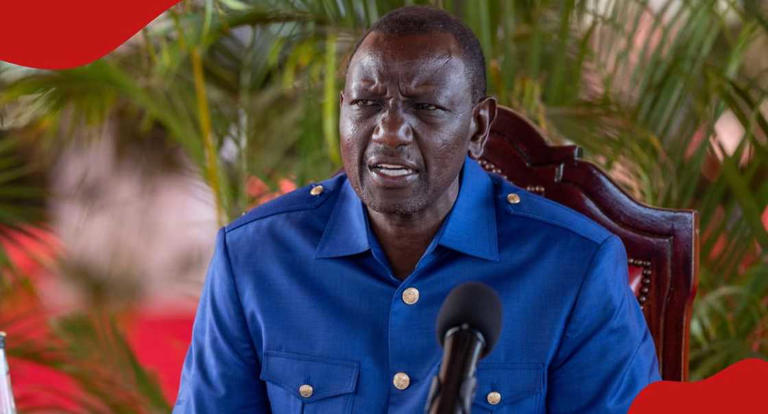By Moses Muli Published: August 30,2024 10:32 AM During a town hall meeting on Thursday,…

Sudan army snubs Geneva ceasefire talks
East African
Published: August 15,2024 04:05 PM
Sudan’s army stayed away from new talks seeking to end on the conflict in the country, even as organisers in Geneva, the venue, said their primary target is to achieve ceasefire.
The Sudan Armed Forces had threatened to boycott the talks called by the US, protesting presence of the United Arab Emirates (UAE) as observers as well as being referred to as representatives of the Sudanese army, rather than the Government of Sudan.
The SAF are the main players in this conflict with the Rapid Support Forces (RSF), a paramilitary security force in Sudan.
US Special Envoy to Sudan, Tom Perriello, said the RSF had agreed to “participate unconditionally,” while the Sudanese military authorities, who argue they are the de facto government, expressed reservations about the US invitation to negotiations in Geneva.
Despite the Sudanese government’s reservations, Perriello insisted on proceeding with the talks, stating that the Sudanese people, who are enduring a devastating conflict, cannot afford further delays. RSF delegations arrived in Switzerland to participate in the closed-door negotiations, while the Sudanese army did not show up, Khartoum confirmed.
Nonetheless, the talks, which were to begin early on Wednesday, delayed as organizers continued to prevail upon Sudan’s army to send representatives. It now appears RSF will discuss some efforts at peace with political movements, but their efforts at peace will still needs the army.
US Secretary of State Antony Blinken had argued the talks were necessary “achieve a cessation of violence across the country, allow humanitarian aid to reach all those in need, and establish a robust monitoring and verification mechanism to ensure the implementation of any agreement.”
He noted that the talks will not “address broader political issues.”
The talks are expected to last 10 days, under the sponsorship of the US and Saudi Arabia, with the African Union, Egypt, the UAE, and the United Nations participating as observers.
Key expected outcomes from the negotiations include securing a ceasefire, ending the war, and ensuring the delivery of humanitarian aid. With the humanitarian situation in Sudan rapidly deteriorating, the delivery of aid has become a critical necessity to save millions of lives.
The Sudanese junta has objected to the inclusion of the UAE, even though the US argues that Abu Dhabi and Cairo can act as “guarantors” to ensure that any agreement reached is implemented and not merely symbolic.
The war has caused devastating humanitarian toll, with UN agencies saying more than half of the country’s population, or 25 million, is in need of food aid. At least 16,000 people have died during the conflict, some from bombings or gunshots, others as a result of cut-off medical supplies for their sicknesses, while others from lack of food and proper nutrition. Some 10.7 million have been displaced from their homes inside Sudan.
Avaaz, a humanitarian watchdog, said the talks were urgently needed to rebuild trust between the SAF and RSF, who are also waging an online war of hate speech and misinformation, fueling the atrocities.
It suggested continued contacts with both parties to ensure they understand the need for ceasefire. But it also said the international community must utilize the stick at hand: Sanctions imposed on warring factions’ leaders.
“Sanctions should be imposed on those responsible for the most serious violations of international humanitarian and human rights law. These sanctions could be triggered if the SAF fails to reopen the Adré border crossing to humanitarian shipments; if the RSF does not guarantee security for UN agencies and international organizations to expand their operations across Sudan; or if the agreements are not implemented, such as continued obstruction of humanitarian aid.”
But while ceasefire is the most needed outcome, Avaaz said the RSF and SAF cannot be part of Sudan’s future government, having failed to lead the country out of a transition, before they fell into war.
“If negotiators prioritize a quick agreement over a lasting solution, they will choose short-term peace over sustainable resolution. International stakeholders must clearly communicate that neither the RSF nor the SAF will participate in Sudanese politics, and that the country’s future will be determined by civilians.”
Sudan’s junta has walked out of talks before. In January, it stopped cooperating with Intergovernmental Authority on Development (Igad), accusing the regional bloc of favoring the RSF. Its representatives also walked out of talks in Jeddah last year, mediated by the US and Saudi Arabia, accusing the RSF of not committing to ceasefire. The Jeddah talks collapsed.
In Geneva, failing to appear may jolt new efforts for ceasefire. But they may also show lack of confidence in US and Riyadh as mediators, meaning the international community may struggle to arrange any new talks.
As with Geneva, the RSF had also indicated readiness to meet under Igad.
Yet, with the world now faced with other conflicts, such as Russia-Ukraine and Hamas-Israel, Sudan’s war may just worsen the humanitarian toll.
The United Nations Security Council is nearly paralyzed regarding the situation in Sudan, as Russia, which supports the army, will not allow the passage of any resolution that impacts its ally and its interests in the region. In the past, the experience of international interventions without a UN mandate, especially in the Libyan case, means there may be little success as long as parties don’t agree to meet face to face.



This Post Has 0 Comments